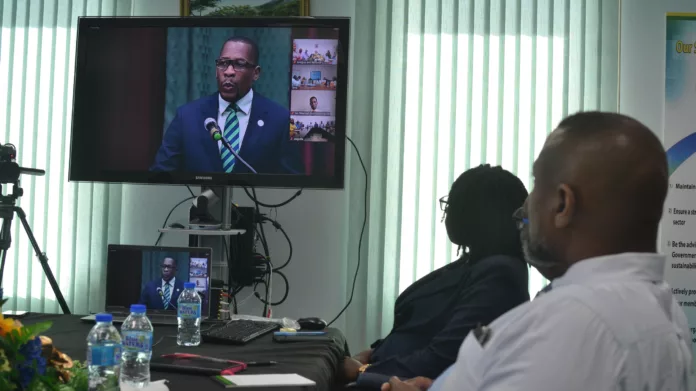
By Elesha George
The Eastern Caribbean Currency Union (ECCU) is grappling with a severe financial literacy deficit, as revealed by a comprehensive survey conducted jointly by the Organisation of Eastern Caribbean States (OECS) Commission and the Eastern Caribbean Central Bank (ECCB).
The survey, launched in August 2022, has revealed that residents of the ECCU do not have an adequate understanding of the most effective ways to save, budget, invest or borrow money.
While the Eastern Caribbean boasts a more than 90 percent level of overall adult literacy, the financial literacy of its citizens is what ECCB Governor, Timothy Antoine described as being “lamentably low”.
The survey’s findings reveal a fundamental lack of knowledge regarding saving, budgeting, investing, and borrowing among ECCU residents. Consequently, many fall prey to scams, engage in high-interest hire purchases, and succumb to the pitfalls of payday loans.
“How do we explain the following persons falling for scams offering prizes for competitions for which they were never registered – that happens more often than we would like to believe; persons engaging in hire purchases, ignorant or indifferent to effective interest rates with some as high as 35 percent; the proliferation of payday loans which essentially means attempting to ride up on a down escalator – it’s a veritable debt trap,” the governor said.
According to the survey, 61 percent of the 7,000 participants had a basic level of understanding of finance and use of finance practices across the eight member states. In the ECCU, the financial literacy score ranged from 11.7 to 13.1 out of 20 points. The highest score was achieved by Anguilla and the lowest score was achieved by Saint Vincent and the Grenadines. According to the central bank, the overall financial literacy scores suggest room for improvement across all elements of financial literacy, that is, financial attitude, knowledge and behaviour.
Amongst the survey’s key findings, more than two in five people or their households are unable to cope with and recover from negative financial shocks, should they occur. It indicated that respondents were ill-equipped to cope with and recover from financial shocks since over half of them indicated that they were not able to meet their living costs in the past 12 months. Further, over two in five individuals indicated that they would not be able to face a major expense today without borrowing from a financial institution or asking family or friends to help.
There is also a relatively high use of cash across the union with over 84 percent of use by respondents in St Vincent and the Grenadines. SVG also achieved the lowest scores in product awareness and financial attitude.
The survey’s findings extended beyond just understanding finances as more than two in five people in the ECCU are also not financially practical. According to Antoine, personal financial management such as budgeting and investing are being ignored because people are choosing to buy the things they want while “begging, family, friends and government for their needs”.
“Urgent action is needed to address financial literacy and inclusion in the ECCU,” Antoine stated, adding that there are “high credential persons” with multiple degrees who are clueless when it comes to managing their personal finances.
Moreover, personal financial management practices like budgeting and investing seem to be on the decline, with more individuals opting to buy what they desire while relying on family, friends, and government assistance for their basic needs. And those who invest invested in the regional and international capital markets make up only one in 25 persons – 4 percent. Still, he said several persons are now taking high-risk investments in cryptos.
The survey also highlighted disparities in financial literacy based on income levels and internet access. Higher-income earners and internet users generally demonstrated higher financial literacy. Residents with a monthly income of $3,000 or more had the highest financial literacy score (13.7 out of 20).
There is a correlation between people who have access to the internet and those who do not. According to the survey results, Montserrat registered the widest gap in financial literacy scores between residents with internet access (13.0 out of 20) and those without internet access (8.8 out of 20).
The good news is financial awareness appears relatively high in the ECCU, with over 88 percent of respondents being aware of at least five of the 18 financial products listed, the survey showed that action lags behind. Only four in 10 individuals use financial accounts for electronic and debit card transactions, indicating a low adoption of modern payment systems. Many residents still rely on family or friends for financial assistance, even when such services are readily available from financial institutions.
The survey revealed that 76 percent of respondents made regular and recurring payments in the 12 months preceding the survey, yet 41.6 percent made at least one electronic payment in the same time period.
Director General of the OECS Commission, Dr Didacus Jules said the survey results are crucial because they indicate the financial vulnerability of the region.
“This shared currency ties our economies together, making collective financial understanding even more crucial. When one of us thrives, we all benefit. Conversely, financial instability in one country can ripple through the entire union,” he remarked.
“When a significant number of individuals lack these skills our entire region can suffer from high debt levels, low savings and missed economic opportunities,” he noted.
The ECCB head has therefore issued urgent call to action to address the region’s financial literacy and inclusion challenges to ensure the prosperity and resilience of its member states.
